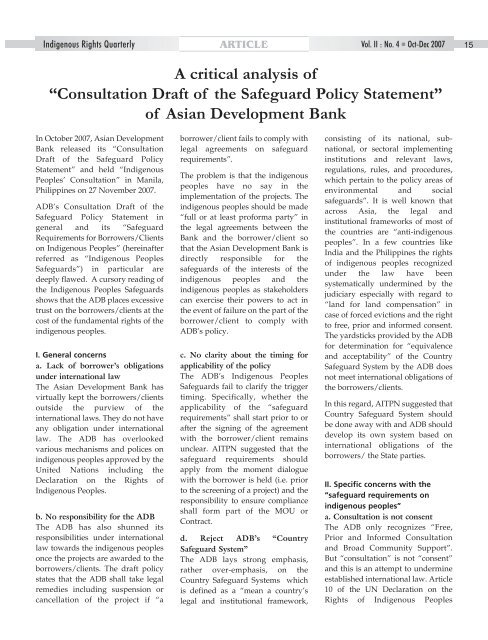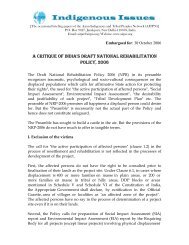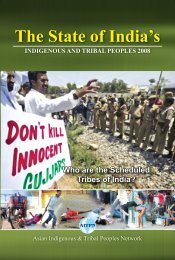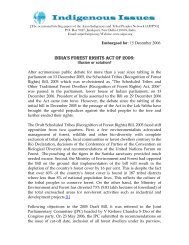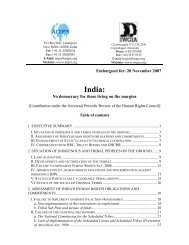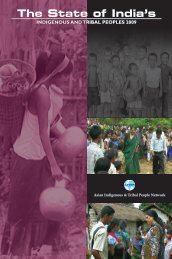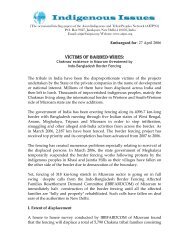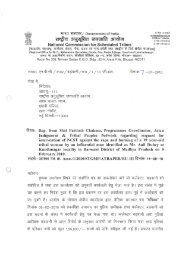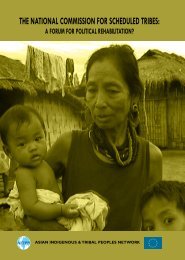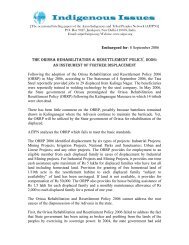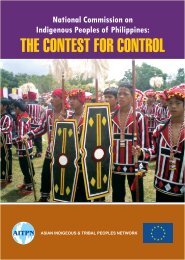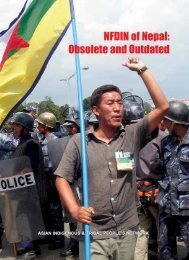Repression of indigenous peoples by - Asian Indigenous and Tribal ...
Repression of indigenous peoples by - Asian Indigenous and Tribal ...
Repression of indigenous peoples by - Asian Indigenous and Tribal ...
You also want an ePaper? Increase the reach of your titles
YUMPU automatically turns print PDFs into web optimized ePapers that Google loves.
<strong>Indigenous</strong> Rights Quarterly ARTICLEVol. II : No. 4 • Oct-Dec 2007 15A critical analysis <strong>of</strong>“Consultation Draft <strong>of</strong> the Safeguard Policy Statement”<strong>of</strong> <strong>Asian</strong> Development BankIn October 2007, <strong>Asian</strong> DevelopmentBank released its “ConsultationDraft <strong>of</strong> the Safeguard PolicyStatement” <strong>and</strong> held “<strong>Indigenous</strong>Peoples’ Consultation” in Manila,Philippines on 27 November 2007.ADB’s Consultation Draft <strong>of</strong> theSafeguard Policy Statement ingeneral <strong>and</strong> its “SafeguardRequirements for Borrowers/Clientson <strong>Indigenous</strong> Peoples” (hereinafterreferred as “<strong>Indigenous</strong> PeoplesSafeguards”) in particular aredeeply flawed. A cursory reading <strong>of</strong>the <strong>Indigenous</strong> Peoples Safeguardsshows that the ADB places excessivetrust on the borrowers/clients at thecost <strong>of</strong> the fundamental rights <strong>of</strong> the<strong>indigenous</strong> <strong>peoples</strong>.I. General concernsa. Lack <strong>of</strong> borrower’s obligationsunder international lawThe <strong>Asian</strong> Development Bank hasvirtually kept the borrowers/clientsoutside the purview <strong>of</strong> theinternational laws. They do not haveany obligation under internationallaw. The ADB has overlookedvarious mechanisms <strong>and</strong> polices on<strong>indigenous</strong> <strong>peoples</strong> approved <strong>by</strong> theUnited Nations including theDeclaration on the Rights <strong>of</strong><strong>Indigenous</strong> Peoples.b. No responsibility for the ADBThe ADB has also shunned itsresponsibilities under internationallaw towards the <strong>indigenous</strong> <strong>peoples</strong>once the projects are awarded to theborrowers/clients. The draft policystates that the ADB shall take legalremedies including suspension orcancellation <strong>of</strong> the project if “aborrower/client fails to comply withlegal agreements on safeguardrequirements”.The problem is that the <strong>indigenous</strong><strong>peoples</strong> have no say in theimplementation <strong>of</strong> the projects. The<strong>indigenous</strong> <strong>peoples</strong> should be made“full or at least pr<strong>of</strong>orma party” inthe legal agreements between theBank <strong>and</strong> the borrower/client sothat the <strong>Asian</strong> Development Bank isdirectly responsible for thesafeguards <strong>of</strong> the interests <strong>of</strong> the<strong>indigenous</strong> <strong>peoples</strong> <strong>and</strong> the<strong>indigenous</strong> <strong>peoples</strong> as stakeholderscan exercise their powers to act inthe event <strong>of</strong> failure on the part <strong>of</strong> theborrower/client to comply withADB’s policy.c. No clarity about the timing forapplicability <strong>of</strong> the policyThe ADB’s <strong>Indigenous</strong> PeoplesSafeguards fail to clarify the triggertiming. Specifically, whether theapplicability <strong>of</strong> the “safeguardrequirements” shall start prior to orafter the signing <strong>of</strong> the agreementwith the borrower/client remainsunclear. AITPN suggested that thesafeguard requirements shouldapply from the moment dialoguewith the borrower is held (i.e. priorto the screening <strong>of</strong> a project) <strong>and</strong> theresponsibility to ensure complianceshall form part <strong>of</strong> the MOU orContract.d. Reject ADB’s “CountrySafeguard System”The ADB lays strong emphasis,rather over-emphasis, on theCountry Safeguard Systems whichis defined as a “mean a country’slegal <strong>and</strong> institutional framework,consisting <strong>of</strong> its national, subnational,or sectoral implementinginstitutions <strong>and</strong> relevant laws,regulations, rules, <strong>and</strong> procedures,which pertain to the policy areas <strong>of</strong>environmental <strong>and</strong> socialsafeguards”. It is well known thatacross Asia, the legal <strong>and</strong>institutional frameworks <strong>of</strong> most <strong>of</strong>the countries are “anti-<strong>indigenous</strong><strong>peoples</strong>”. In a few countries likeIndia <strong>and</strong> the Philippines the rights<strong>of</strong> <strong>indigenous</strong> <strong>peoples</strong> recognizedunder the law have beensystematically undermined <strong>by</strong> thejudiciary especially with regard to“l<strong>and</strong> for l<strong>and</strong> compensation” incase <strong>of</strong> forced evictions <strong>and</strong> the rightto free, prior <strong>and</strong> informed consent.The yardsticks provided <strong>by</strong> the ADBfor determination for “equivalence<strong>and</strong> acceptability” <strong>of</strong> the CountrySafeguard System <strong>by</strong> the ADB doesnot meet international obligations <strong>of</strong>the borrowers/clients.In this regard, AITPN suggested thatCountry Safeguard System shouldbe done away with <strong>and</strong> ADB shoulddevelop its own system based oninternational obligations <strong>of</strong> theborrowers/ the State parties.II. Specific concerns with the“safeguard requirements on<strong>indigenous</strong> <strong>peoples</strong>”a. Consultation is not consentThe ADB only recognizes “Free,Prior <strong>and</strong> Informed Consultation<strong>and</strong> Broad Community Support”.But “consultation” is not “consent”<strong>and</strong> this is an attempt to undermineestablished international law. Article10 <strong>of</strong> the UN Declaration on theRights <strong>of</strong> <strong>Indigenous</strong> Peoples


